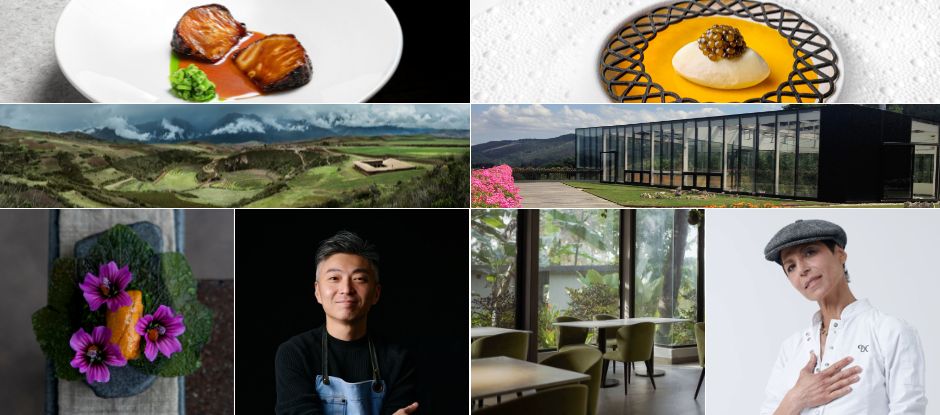From using only hyperlocal ingredients to going zero waste, working closely with producers, looking after staff and utilising some very clever initiatives, these are some of the most forward-thinking and sustainable restaurants on the planet
The number of diners interested in what happens beyond the pass just keeps growing. It is no longer just about how food tastes and looks, but also about ethical actions, where everyone and everything involved in the supply chain is respected, from the ingredients to the producers. At these innovative establishments, serving great food, resourceful chefs are striving to have less of an impact on the environment while simultaneously looking to improve the health and happiness of staff, local communities and suppliers.
Boragó, Santiago
@boragoscl
Sustainable Restaurant Award – The World’s 50 Best Restaurants 2021 and Latin America’s 50 Best Restaurants 2018 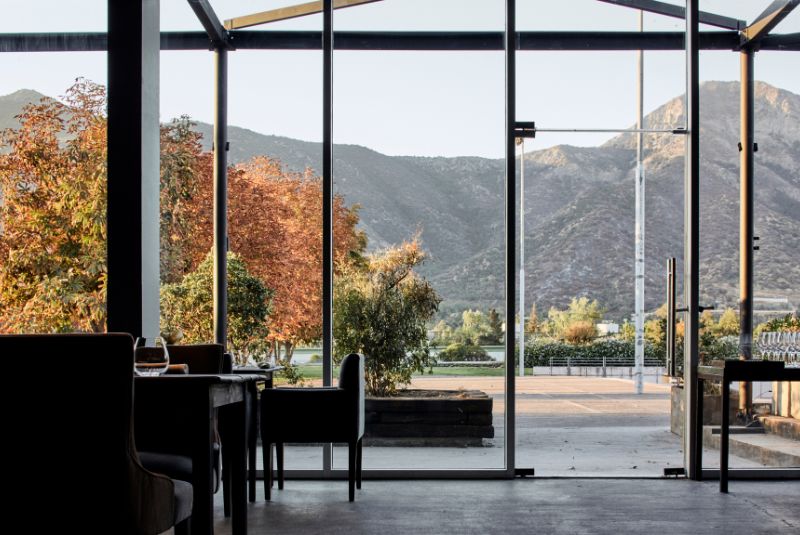
Located in the enchanting foothills of Cerro Manquehue near Santiago, Boragó’s setting gives a hint as to what drives the kitchen: Chile itself. For chef Rodolfo Guzmán, sustainability is deeply rooted in the landscape. The team is reviving Indigenous Mapuche tribe cooking techniques and sources its ingredients from small producers who preserve little-known plants and species. The restaurant also owns a biodynamic farm that provides vegetables, milk and ducks for the kitchen.
Fyn, Cape Town
@fynrestaurantcpt
Sustainable Restaurant Award – The World’s 50 Best Restaurants 2023 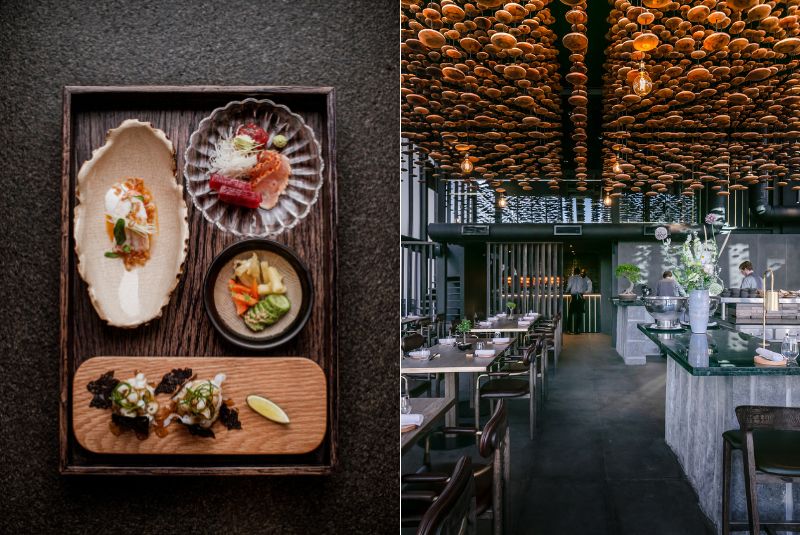
Every aspect of Fyn celebrates elements of South Africa, Japan and sustainability, from the dining room shaped by local craftspeople to the native ingredients and Japanese techniques found in the kitchen. Through meticulous research and “a lot of trial and error,” chef-owner Peter Tempelhoff brought ancient local ingredients like kelp to the menu, along with an abundance of produce that hasn’t yet been brought to the local – or international – market. The restaurant also has a strong workplace culture, with a focus on employee progression and happiness.
Haoma, Bangkok
@haomabkk
Sustainable Restaurant Award – Asia’s 50 Best Restaurants 2024 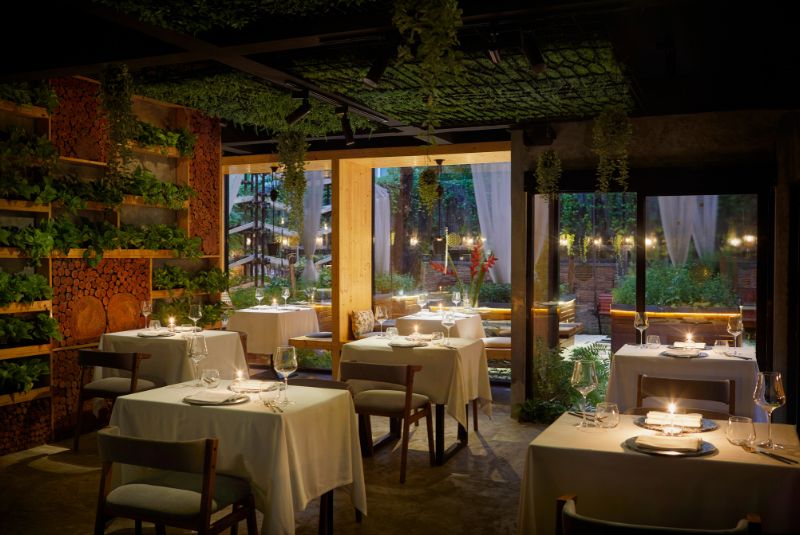
Led by Indian-born chef and restaurateur Deepanker Khosla, Haoma is a hyper-local, hyper-seasonal neo-Indian restaurant focused on farm-to-fork cooking. Run on the philosophy, ‘grow to give back’, Khosla continually challenges himself to keep Haoma a sustainable culinary paradise. From rearing fish in water from its rain harvesting system and feeding them with waste from the kitchen, to working with local food experts to archive traditional ingredients, everything Haoma does has the planet in mind.
Manu, Curitiba
@restaurantemanu
Sustainable Restaurant Award – Latin America’s 50 Best Restaurants 2023 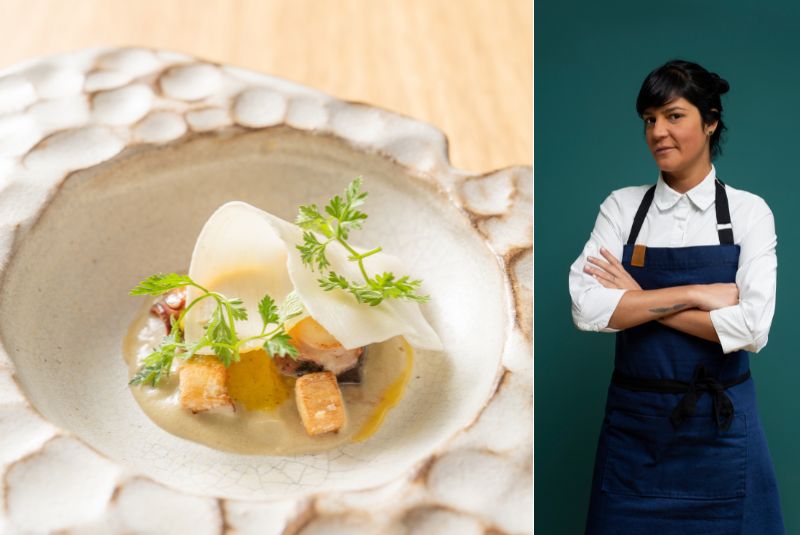
Far from being ‘just’ a fine dining chef, Manoella ‘Manu’ Buffara consistently gives back to her community, building urban gardens, installing beehives and transforming abandoned parts of Curitiba into farms for locals. At the restaurant, most ingredients are sourced from its wide network of small farms and artisans located within 300 kilometres. Beef has not been served since 2019 and the menu comprises 60 per cent plant-based dishes.
Aponiente, El Puerto de Santa María
@aponiente_angel_leon
Sustainable Restaurant Award – The World’s 50 Best Restaurants 2022 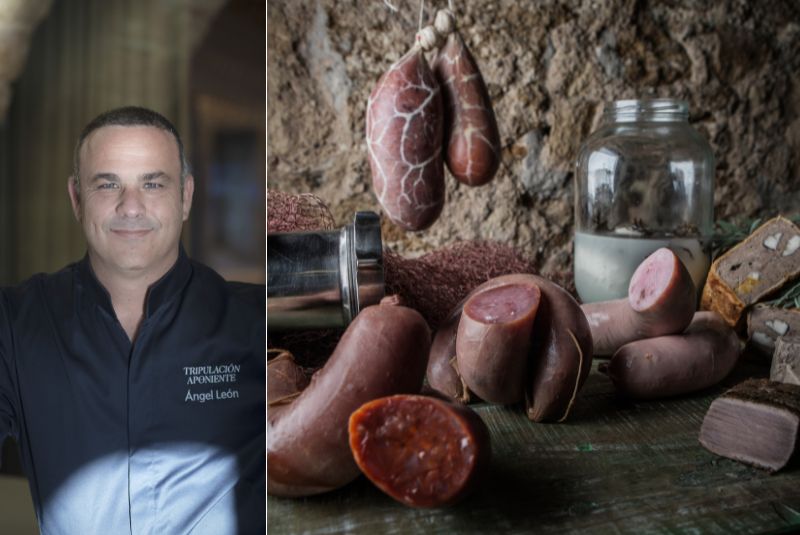
Located in an 18th-century tidal mill, Aponiente is a seafood lover’s paradise. Fisherman-chef Ángel León serves two tasting menus featuring the likes of goose barnacle, fiddler crab, albacore and even plankton. León turns produce discarded by commercial fishing boats into gastronomic art and ‘seacuterie’, from sausages to burgers, black pudding, ham and salami. Marine cheese is made from tuna roe which is usually discarded, and León makes a sweet tart filling from fermented seaweed.
Lowe, Dubai
@lowedxb
Sustainable Restaurant Award – Middle East & North Africa’s 50 Best Restaurants 2022 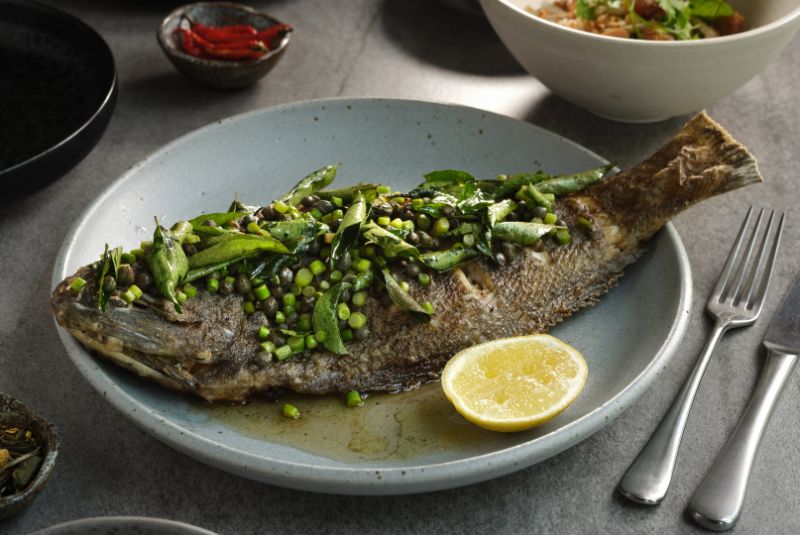
Lowe, a neighbourhood restaurant on the outskirts of Dubai led by Kate Christou, is working towards zero food waste. Christou has hosted classes to teach the public how to repurpose common waste at home, has built a vegetable garden and even has a ‘Waste Not’ series: a rotating 10-course menu of plates and drinks created from restaurant scraps, which might include ginger peel, coriander stalks and fish heads. In 2024, Lowe partnered with an oyster farm to repurpose empty shells to create reef structures around Dibba on the Eastern Gulf of Oman coast.
Nobelhart & Schmutzig, Berlin
@nobelhartundschmutzig
Sustainable Restaurant Award – The World’s 50 Best Restaurants 2024 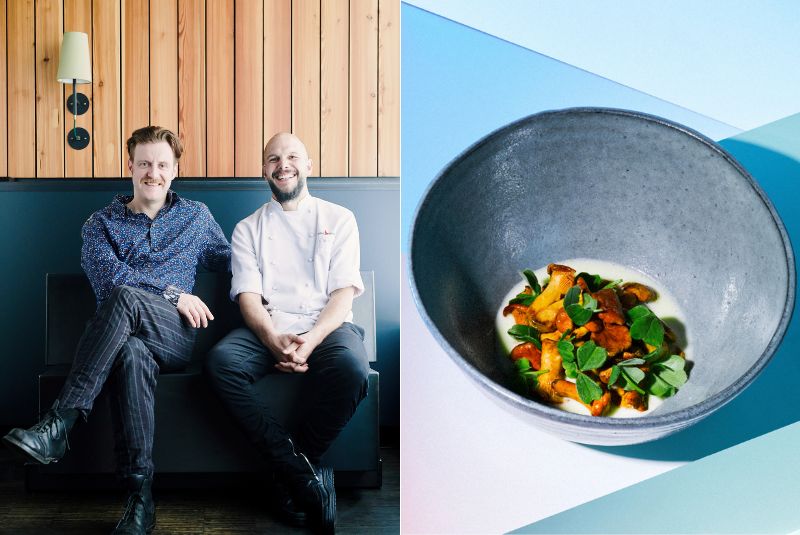
Nobelhart & Schmutzig takes a holistic approach when it comes to sustainability. From ingredients to operations, staff culture and suppliers, everything is viewed through a progressive lens. Alongside initiatives like making napkins from old bedsheets and glueing together broken crockery, owner-sommelier Billy Wagner and chef Micha Schäfer created a pioneering Guide of Conduct to help provide staff with a secure, inclusive and safe working environment.
Septime, Paris
@septimeparis
Sustainable Restaurant Award – The World’s 50 Best Restaurants 2017 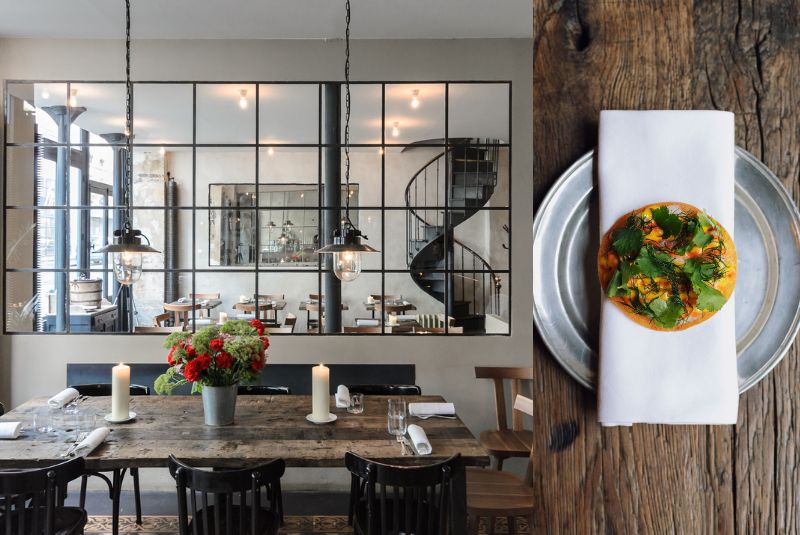
Arguably the coolest restaurant in Paris, Septime is a neo-industrial bistro led by Bertrand Grébaut. Opened in 2011, the restaurant has been working to improve its eco credentials ever since. The set menu is based on micro-seasonality, with produce coming from the Île-de-France region, while meat and fish are also sourced sustainably. There’s a real focus on combating waste, with everything biodegradable composted.
Diacá, Guatemala City
@diacagt
Sustainable Restaurant Award – Latin America’s 50 Best Restaurants 2022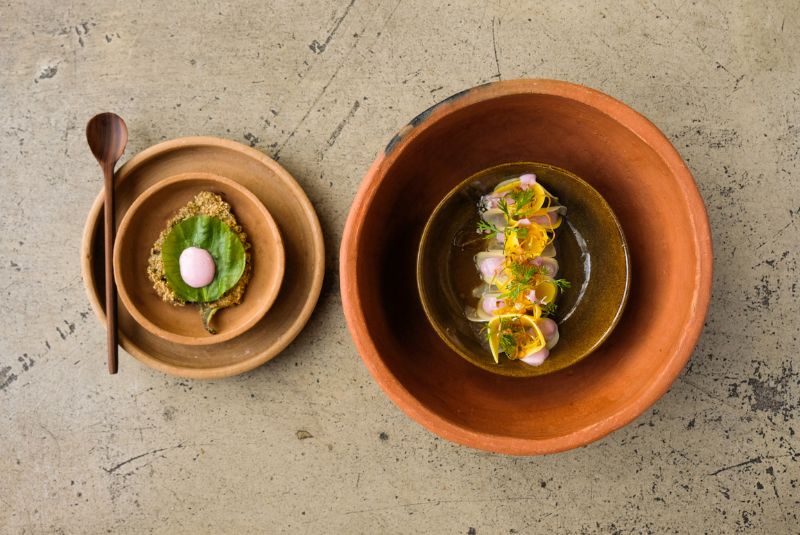
Diacá means ‘from here’ in Spanish, which might help you guess where the ingredients are sourced from at this Guatemalan restaurant. Debora Fadul is leading the way on sustainability, honouring ancestral cuisine, while fostering a network of small producers across the country. The chef’s connection to the land runs deep, extending beyond her plant-forward recipes.
Nôl, Tokyo
@nol.jp 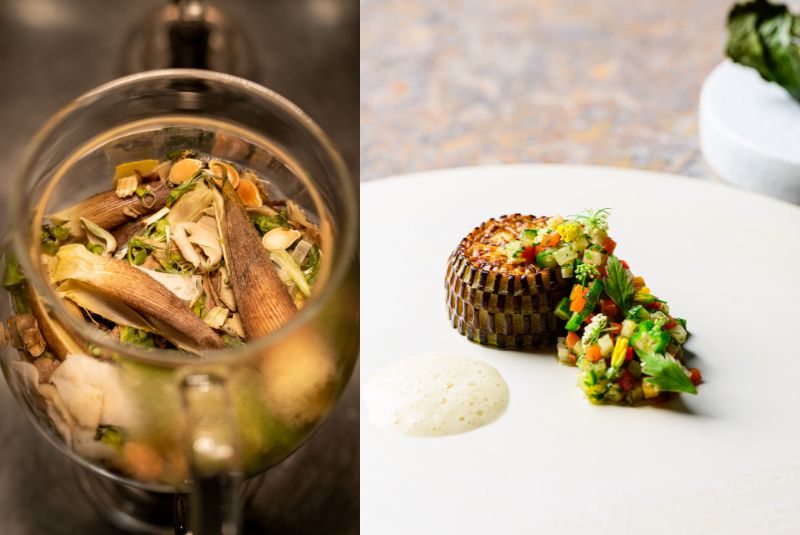
Chef Tatsuya Noda takes inspiration from his childhood to create this sustainable gastronomic haven. A meal at Nôl begins with the appetisingly named ‘garbage soup’, made from the roots, leaves and trimmings of ingredients used in that day’s dishes. Any food waste is carefully sorted, composted and used as fertiliser. The team works with local producers to utilise less popular ingredients and any imported produts are carefully sourced through direct trade.
Silo, London
@silolondon 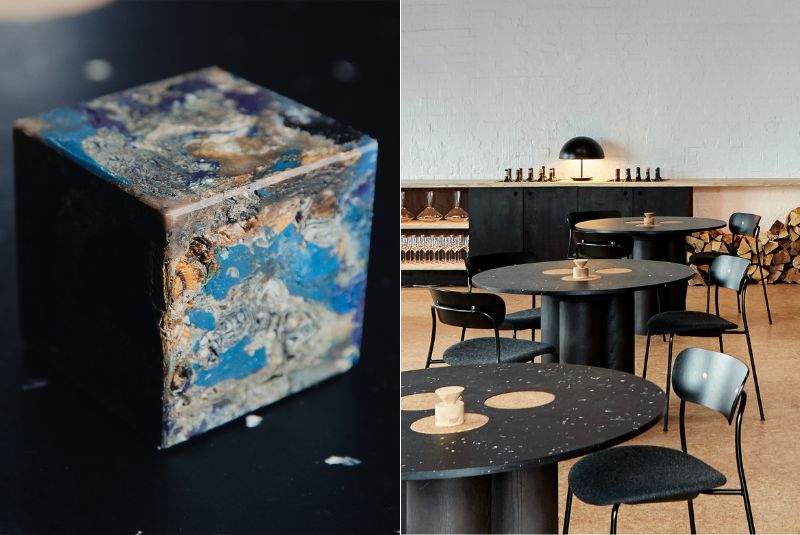
How much waste do you think a restaurant would have in 18 months? A lot? Not at Silo, where the waste can be held in your palm and there’s no bin on site. With a root-to-leaf philosophy, any animal or vegetable used will be used in its entirety. The team also churns its own butter, rolls its own oats, plus the restaurant has a flour mill where ancient wheat varieties are ground.
Midunu, Accra
@midunu .jpg)
Chef Selassie Atadika advocates for the use of resilient local grains such as sorghum and millet, selecting local and seasonal ingredients, traditional proteins and often-overlooked produce to bring Africa’s bounty to the table. Atadika also established the Midunu Institute, a non-profit organisation dedicated to investigating, documenting and preserving community recipes, food and knowledge.
Mil, Moray
@milcentro 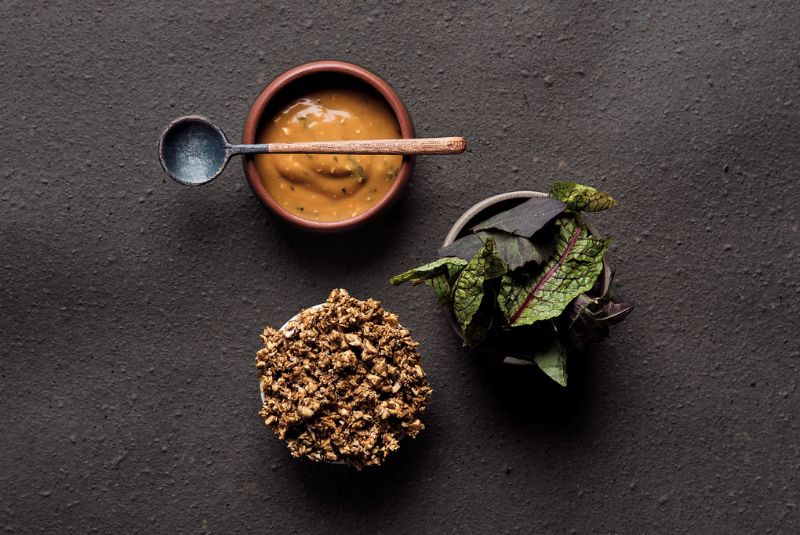
A trip to Mil, found close to the Moray ruins above Cusco in Peru, is much more than a meal: it’s an immersive experience learning about history, culture and food. Guests tour farmlands, search for plants, discover Mater Iniciativa – the attached research institute – and meet local producers and suppliers. The day concludes with an eight-course tasting menu celebrating Andean culinary traditions.
Saint Peter, Sydney
@saintpeterpaddo 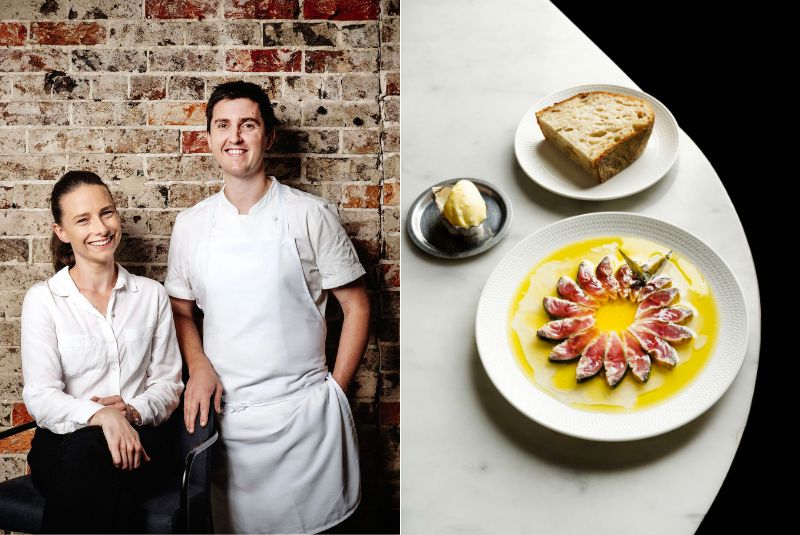
Josh Niland is at the helm of this seafood specialist, which is leading Australia's gill-to-fin movement. Niland favours techniques typically associated with meat. From dry ageing in custom-designed cool rooms to whole fish butchery and imaginative use of offal, waste has no place here. The Aussie chef utilises almost every part of a fish and transforms it into dishes like Tiramisu a la Pesce made with fish bones, fat and eyes. The ultra-inventive menu changes daily according to the morning’s catch.
Toyo Eatery, Manila
@toyoeatery
Sustainable Restaurant Award – Asia’s 50 Best Restaurants 2023 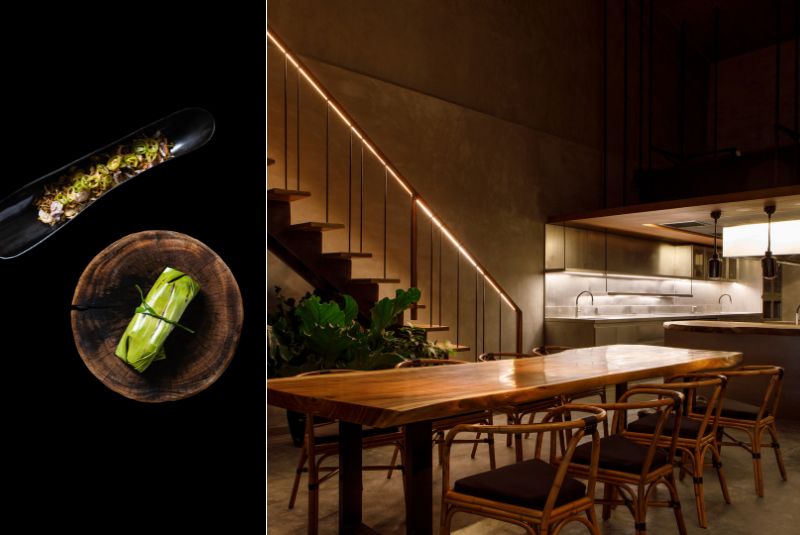
Run by husband-and-wife team Jordy and May Navarra, this Filipino restaurant has a goal of becoming zero waste by 2025. So far, it has removed beef from the menu, renovated the space to enhance R&D, prep, recycling and composting infrastructure, partnered with a local urban farm to process fermented bokashi waste and asks producers to focus on best-in-season ingredients. Currently, more than half the menu is vegan or vegetarian, with plans to go entirely plant-based.
Azurmendi, Larrabetzu
@azurmendi_atxa
Sustainable Restaurant Award – The World’s 50 Best Restaurants 2014 and 2018 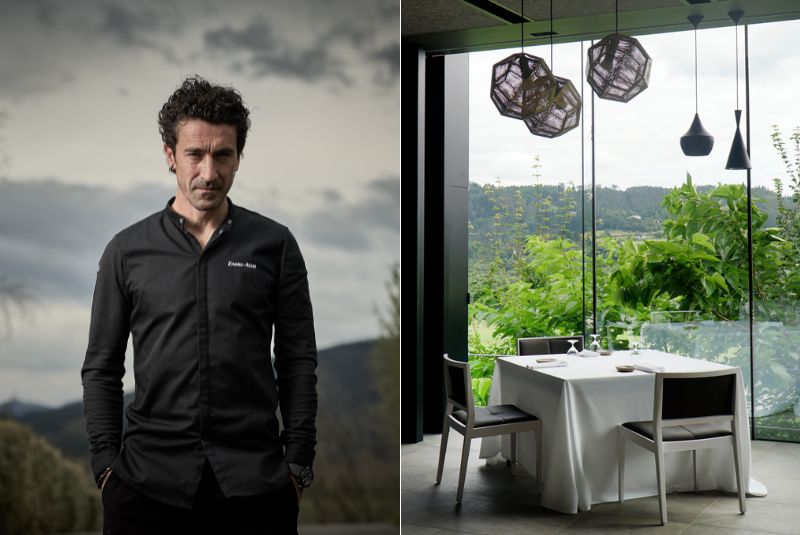
Azurmendi is renowned as one of the world’s most sustainable and eco-friendly restaurants. Housed in a unique bioclimatic building, it seamlessly integrates with the surrounding vineyards, blurring the line between architecture and nature. Chef-owner Eneko Atxa Azurmendi recycles all waste, composts organic matter to create fertilisers and reduces CO2 emissions by using a single truck to collect ingredients from different producers.
Atelier Crenn, San Francisco
@atelier.crenn 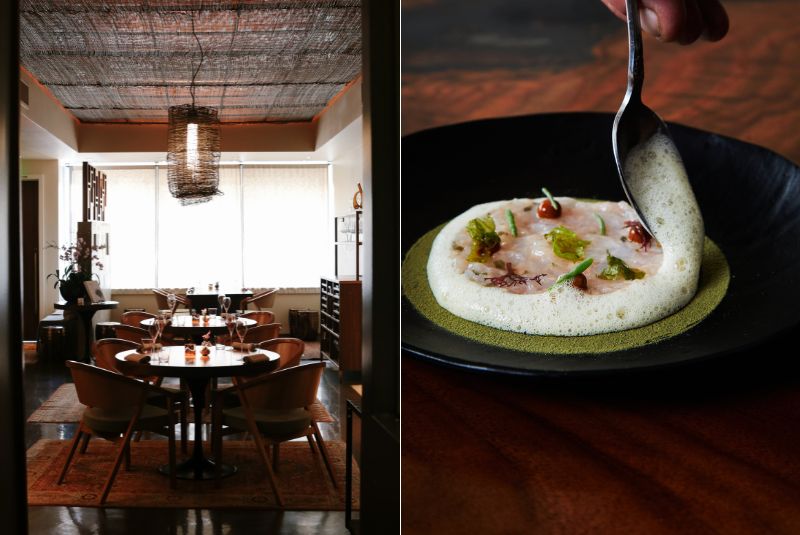
Acclaimed chef Dominique Crenn's menu is meat-free, with dairy-free and pescatarian options, and is crafted in collaboration with local biodynamic farmers. Any food waste is composted at Crenn's Bleu Belle Farm, which serves as a regenerative agriculture hub. Additionally, Atelier Crenn is certified as a Plastic Free establishment, meaning there are no single-use plastics on site – it was the first restaurant in the US to do so.
Gustu, La Paz
@gusturestaurant 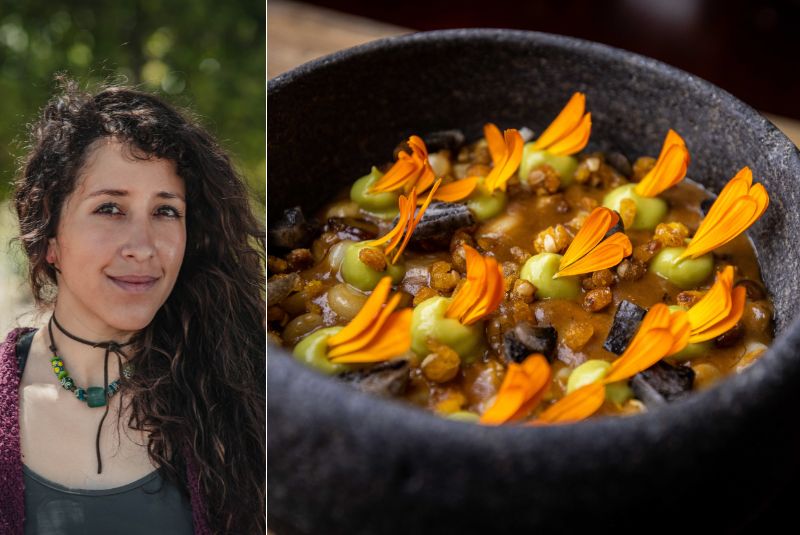
With the firm belief that gastronomy can change society, Gustu (meaning flavours in Quechua) aims to help create a more inclusive and equitable world. Led by Marsia Taha, the food is focused on Bolivia and features endemic and long-forgotten ingredients. Gustu leads research trips to far-flung regions, aiming to identify new species, showcase unknown produce and develop relationships with small-scale producers. From the Andes to the Amazon, Taha takes diners on a journey across the incredibly biodiverse Bolivian landscape.
FarmLore, Bengaluru
@farmlore.in 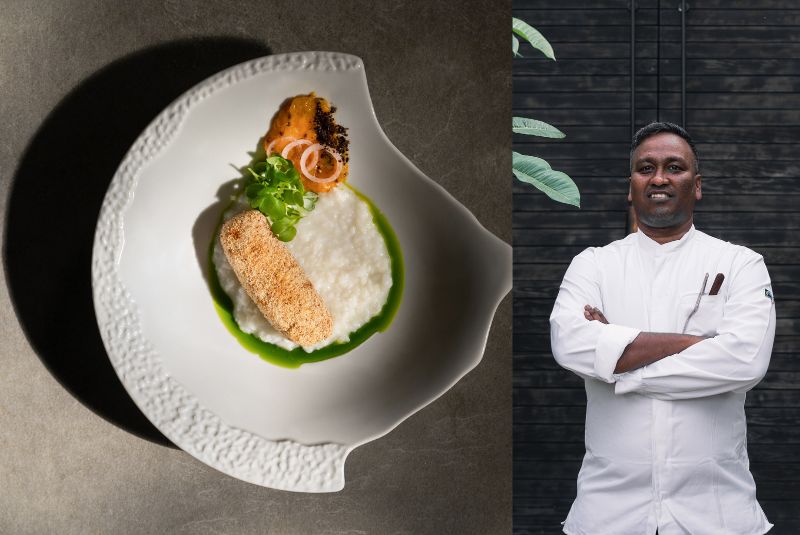
FarmLore is focused on discovering and celebrating ‘locavore’ traditions, cultures and their connection with the Earth. This 18-seat, chef's table-style restaurant is in the middle of a 37-acre farm, and its menu is determined by what is grown there. Johnson Ebenezer, Mythrayie Iyer and Avinnash Vishaal lead the project; the chefs practice ethical farming principles passed down for generations and maintain soil nutrient health through organic practices. They use ancestral techniques and the restaurant operates entirely on solar power.
Mume, Taipei
Sustainable Restaurant Award – Asia’s 50 Best Restaurants 2022 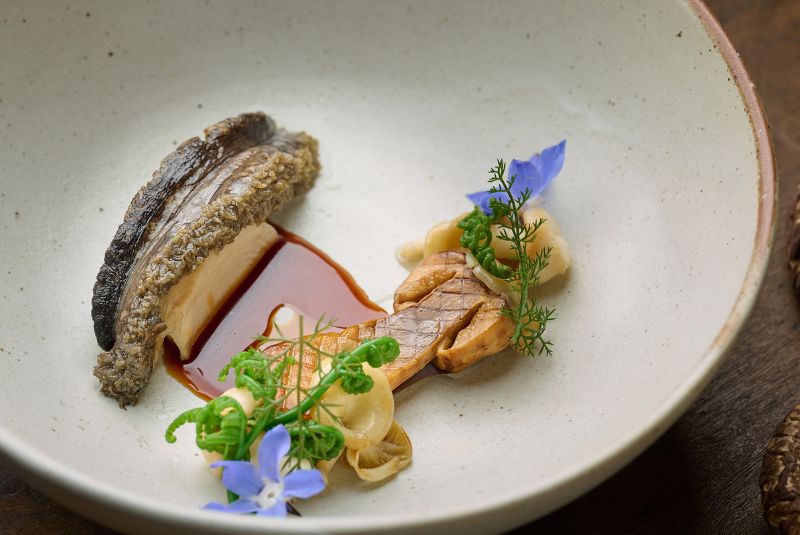
Named after the national flower of Taiwan, Mume is a farm-to-table restaurant celebrating local ingredients and seasonality. When Mume opened, chef Richie Lin and his staff spent four years learning about Taiwan and its seasonality, which allowed them to create a strong ingredient database. Starting with 90 per cent locally sourced ingredients, this figure has increased every year – they’re now close to 100 per cent. The restaurant is also working towards becoming zero waste.
Mühle, Warth
@kartauseittingen 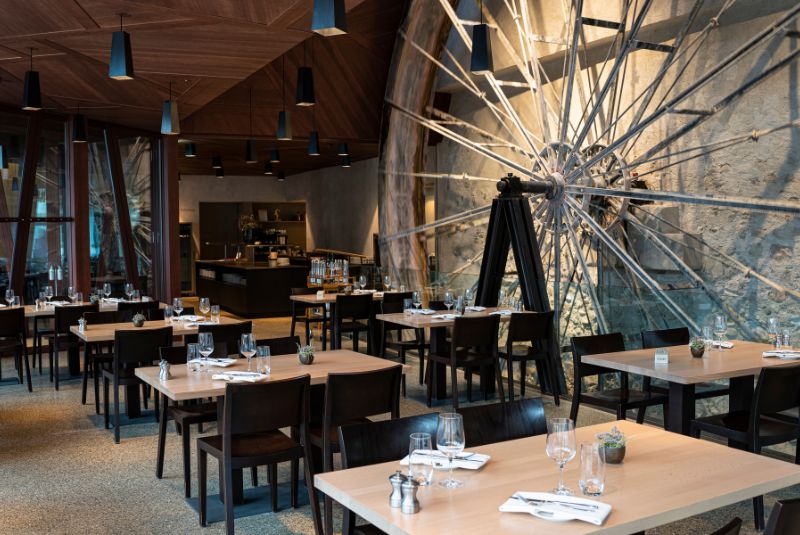
This restaurant is part of a former Carthusian monastery in Switzerland. Maintaining the monastic tradition of self-sufficiency, Mühle uses ingredients from its own 100-acre farm, cheese dairy, butchery, bakery, market garden, fish farm and wine cellar. The distance between the milking parlour and in-house dairy is a mere 200 meters, and the herb garden is only a stone’s throw from the kitchen. Even the grapes used to make wine are grown in vineyards surrounding the monastery.
Follow 50 Best on Instagram, Facebook, Twitter and YouTube for the latest news, features, videos and stories from the best chefs and bartenders across the world, and use 50 Best Discovery for all of your dining, drinking and destination planning.
